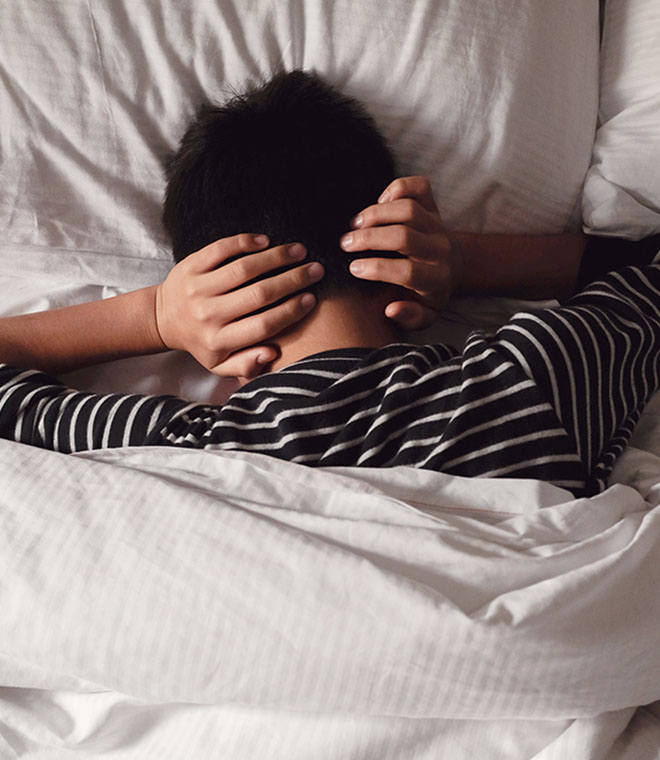Health
Children's depression and treatment
By Rebecca Thomas, RN, BSN, CPHQ Jul 18, 2022 • 12 min
Depression is a broad term with many different meanings. Clinically, the term depression (also known as major depressive disorder) describes a common but serious mood disorder that can negatively affect a person's thoughts, behavior and feelings. Depression can cause someone to feel sadness and experience a loss of interest in things they once enjoyed. This can lead to different emotional and physical problems, and it can make it difficult for someone to function well at work, school and home.
Depression commonly affects children and adolescents. In 2020, an estimated 4.1 million adolescents in the U.S., ages 12 to 17, had at least one major depressive episode. This represents 17% of youth in this age range. More adolescent females (25.2%) experience a major depressive episode compared to adolescent males (9.2%). Additionally, almost 3 million adolescents (12%) in the same age group had at least one major depressive episode and were impaired enough to significantly impact their chores at home, school, work, family relationships or social life.
A major depressive episode lasts two weeks or longer, during which the child or adolescent experiences a depressed mood, a loss of interest or pleasure, and at least five other symptoms that reflect a change in function, such as problems with sleeping, eating, energy, concentration, indecisiveness, self-image or recurrent thoughts of death or suicide.
Chronic depression (dysthymia) describes a consistent depressed or irritable feeling for most of the time for at least one year, in addition to two or more of the symptoms associated with major depressive episodes, as mentioned above.
Signs of depression in children
The symptoms of depression in children may vary from those in adults, especially since feeling sad at times is a normal part of growing up. When describing how they feel, some children may deny feeling sad, but will admit to feeling down, irritable or just not enjoying themselves as they did before. Some of the more common symptoms a parent may notice in their child or adolescent include spending less time with friends or in after-school activities, feeling like everything is their fault or they are not good at anything, caring less about school, and often feeling tearful. Children may also describe feeling more physical symptoms, such as frequent headaches and stomach aches.
It is important to talk to your child about what is going on in their daily lives and ask if there is anything bothering them, as depression can often be caused by being under a great deal of stress due to losing someone close to them, bullying, school demands or even spending too much time using social media. Some depressed children or adolescents may even admit to wanting to hurt themselves.
Parents should not try to treat their child's depression on their own. If you think your child or adolescent is depressed or see signs that concern you, promptly seek help from a professional, such as a pediatrician, school counselor or mental health professional. Depressed children often don't recognize they are depressed and are commonly referred for evaluation and treatment based on their individual needs. The sooner you seek help, the better, especially since having other conditions, such as learning issues, conduct or anxiety disorders, may put your child at a higher risk of developing or aggravating depression.
Should your depressed child take medication?
Before considering any medication for depression, a child or adolescent should be carefully and thoroughly evaluated by a medical provider, such as a psychiatrist specialized in treating children and adolescents or a pediatrician experienced in the treatment of mood disorders in this age group. A thorough assessment will help determine an accurate diagnosis and the most appropriate treatment plan for the child. While most children who take antidepressants will improve with medication, combining medication with talk therapy (counseling) is likely to be even more effective.
Although there has been a concern that antidepressant medication may encourage suicidal behavior or thoughts in children and young adults, newer research indicates that the benefits of these medications likely outweigh the risks versus leaving the depression untreated. It is important to speak with your child’s medical provider about all treatment options. In addition, children who are prescribed medication should receive close ongoing medical monitoring. Once treatment has started, families should not discontinue medication without consulting their provider.
Therapy types for children with depression
Psychological therapies for depression in children and adolescents include a number of approaches, such as cognitive behavioral therapy and interpersonal therapy, which include talking with the child and their family members to help the therapist understand possible influencing factors and teaching the child or adolescent coping and problem-solving skills, as well as effective communication skills.
How can you help your child with depression?
There are several things you can do to help a child struggling with depression, including:
- Promoting an environment where your child feels safe talking about their feelings and about things going on in their daily lives, such as in school, sports and friendships
- Talking about things that will benefit their mood, such as eating well, exercising and seeking fun activities with friends to promote positive connections with others
- Limiting screen time and encouraging spending one-on-one time with you
- Praising good behavior and pointing out their strengths, as this helps build a strong bond and foster a sense of trust
- Fostering a space of safety and security by speaking openly about bullying, grief or loss, and letting them know that you are there to support them through the challenges they may face as children/adolescents
- If you have dealt with depression yourself, sharing your own experiences and letting them know they are not alone in their feelings
- Teaching your child or adolescent how to break down problems or overwhelming tasks, such as school projects, into smaller, more manageable steps
- Helping them to look for the positive in situations, especially encouraging them to think about how they can learn and grow from experiences
Children of depressed parents
Children are more likely to struggle with depression when their parents have depression. If you experience any of the following symptoms, seek professional help:
- Loss of interest in normal activities and hobbies
- Excessive anger or outbursts
- Feeling sad or hopeless
- Changes in eating and weight
- Feeling too exhausted to complete even small tasks
- Excessive anxiety or worry
- Continued self-blame for past mistakes or failures
- Physical pain, such as headaches
- Thoughts of suicide or self-harm
It's important to remember that children of depressed parents can live a happy, depression-free life. Parents who take care of their own mental health and seek therapy will be better equipped to help their children thrive.
Finding the right therapist for your child
When your child or adolescent exhibits signs of depression, it's imperative to not delay getting them professional help and treatment. The key is to find a therapist or counselor that your child connects with, trusts, and who is the right fit for your family.
Effective children's therapists work closely with the child's support system, understanding the family dynamic and creating a partnership with the child's best interest in mind.
Also, remind your child or adolescent that you are there to talk with them about how they feel about their therapy and their own progress. If they express negative feelings regarding their sessions, or if you are concerned that your child does not seem to be opening up to the therapist after a reasonable amount of time, it may be time to consider finding a new therapist or counselor. It is important to find one who makes your child feel more comfortable and positive about their therapy as this will encourage a better outcome.
You can learn about different kinds of mental health therapy, video chat live with a therapist for an initial consultation, or visit Mental Health America for a full list of mental health support organizations and therapists in your area to help you find the care your child needs.
Clinically reviewed and updated July 2022.
Sources:
- https://psychiatry.org/patients-families/depression/what-is-depression
- https://www.nimh.nih.gov/health/statistics/major-depression
- https://www.ncbi.nlm.nih.gov/sites/books/NBK35129/table/A58167/
- https://www.aacap.org/AACAP/Families_and_Youth/Facts_for_Families/FFF-Guide/The-Depressed-Child-004.aspx
- https://www.mayoclinic.org/diseases-conditions/teen-depression/in-depth/antidepressants/art-20047502
- https://www.healthychildren.org/English/health-issues/conditions/emotional-problems/Pages/Childhood-Depression-What-Parents-Can-Do-To-Help.aspx.
- https://www.psychologytoday.com/blog/nurturing-resilience/201011/finding-great-therapist-your-child


